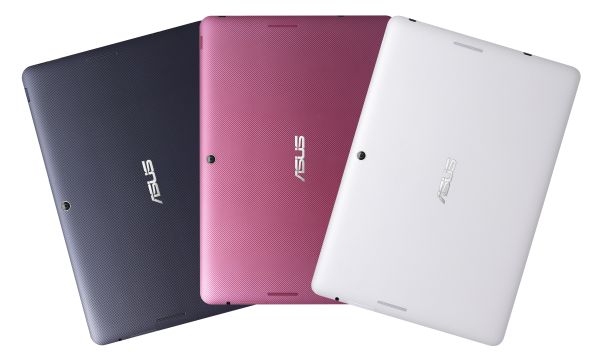Earlier this year Asus released a 10 inch Android tablet called the MeMO Pad Smart ME301T which offered more bang for the buck than almost any other 10 inch tablet on the market. You could thank the speedy NVIDIA Tegra 3 quad-core CPU and low starting price of $299 for that.
Now Asus is getting ready to refresh its MeMO Pad lineup, and the company’s new 10 inch model has a higher resolution display and an entirely new processor.
While Asus hasn’t said how much the new Asus MeMO Pad FHD 10 will cost, I suspect it’ll sell for around the same price as its predecessor, much like the company’s new 7 inch MeMO Pad tablet.

The MeMO Pad FHD 10 features a 1.6 GHz Intel Atom Z2560 Clover Trail+ dual core processor, a 10.1 inch, 1920 x 1200 pixel IPS display, stereo speakers, and up to 10 hours of battery life. The tablet runs Android 4.2 Jelly Bean.
It has a 5MP rear camera with autofucus, and a 1.2MP front-facing camera for video chat.
The tablet supports 802.11a/b/g/n WiFi, GPS and GLonass, and will be available with 16GB to 32GB of built-in storage. There’s also a microSD card slot for removable storage.
The Asus MeMO Pad FHD 10 measures 10.4″ x 7.2″ x 0.38″ and weighs 1.3 pounds, making it bigger and heavier than its 7 inch sibling, but a little bit thinner.



could you run ubuntu on it easily?
Article says Android 4.2… ASUS say Android 4.1: https://uk.asus.com/Tablet/MeMO_Pad/ASUS_MeMO_Pad_Smart_10/#specifications
Makes me wonder if this is going to be upgradeable or one of those awful devices which is lumbered with outdated and non-upgradeable software.
That’s odd — the press release says Android 4.2.
https://press.asus.com/asus-announces-memo-pad-hd-7-and-memo-pad-fhd-10-tablets/
I’d guess ASUS has created this version of Android on their own starting from the AOSP or from their existing ARM Android codebase. Intel’s Android-IA doesn’t support this SoC and Android-x86 isn’t really near “prime time” yet with numerous sensor and device support issues open yet and performance problems.
While I’m blathering on about ASUS, when we will we hear a little about ASUS’ Transformer Book Trio here?
https://www.anandtech.com/show/7017/the-asus-transformer-book-trio-atom-haswell-android-windows-8
“In a move that’s sure to keep Microsoft grumpy, the TF Book Trio runs both Windows 8 and Android. It looks like the 1080p IPS display portion of the detachable notebook is an Android tablet, while the base runs Windows 8.”
At 6:22 this morning… I’ve been keeping busy today.
https://liliputing.com/2013/06/asus-transformer-book-trio-all-in-one-desktop-tablet-notebook-with-android-and-windows.html
Thanks, no clue how I had missed that one!
I’m a little surprised I remembered writing it. Computex is quickly becoming a blur. 🙂
Nope, the Android/tablet part is run by the Clover Trail+… that’s the Z2580 mobile SoC used in Smart Phones running Android and not the one Z2760 used in Windows 8 tablets!
Besides, Google officially supports Intel processors! It’s why Intel based Smart Phones are being released with the latest version of Android!
let’s wait for the price now. I can’t imagine a low price for such a high-end device especially from asus (just look at the new asus transformer pad infinity for 800$)
why intel? why should we resort to ARM emulation on some of apps?
because it’s fast
As more x86 Android gets out into the wild developers using the NDK will start adding both ARM and x86 versions within their APKs. Even MIPS is still a possible NDK target. Fairly easy to do and it only adds a little bit of size to a typical application’s APK.
Over time this will make ARM emulation less of an issue for high quality apps.
Most Android apps are hardware agnostic and will run on anything… Only the native apps, mainly games, that are optimized for ARM hardware would have issue…
Intel uses Binary Translation Layer to help support native apps but it’s not 100%… leaving less than 10% of Android apps that either won’t run or are buggy but like Arrdee pointed out the developers can cover x86 now and the more wide spread these Intel systems running Android become then the more we’ll see direct support for them and not just ARM.
The Z2580 and even the Z2560 are pretty high performers anyway… performance wise they compare very well with for example AnTuTu scores of ranging from over 24,000 to near 29,000 between the two SoCs models I mentioned…
These SoCs also support Intel’s Hardware Virtualization technology… So emulation won’t get as much of a performance hit, if they decide to make use of that to improve compatibility until developer support improves…